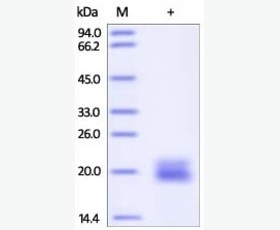Recombinant Mouse M-CSF/CSF1
| Product name: | Recombinant Mouse M-CSF/CSF1 |
| Source: | Human Cells |
| Purity: | Greater than 95% as determined by reducing SDS-PAGE. |
| Buffer Formulation: | Lyophilized from a 0.2 μm filtered solution of PBS, pH7.4. |
| Applications: | Applications:SDS-PAGE; WB; ELISA; IP. |
| Storage: | Avoid repeated freeze/thaw cycles. Store at 2-8 oC for one month. Aliquot and store at -80 oC for 12 months. |
| UOM: | 100ug/50ug/200ug/1mg/1g |
| Source | Human Cells |
| Description | Recombinant Mouse Macrophage colony-stimulating factor 1 is produced by our Mammalian expression system and the target gene encoding Lys33-Glu262 is expressed. |
| Names | Macrophage colony-stimulating factor 1;CSF-1;MCSF;Csf1;Csfm |
| Accession # | P07141 |
| Formulation | Lyophilized from a 0.2 μm filtered solution of PBS, pH7.4. |
| Shipping |
The product is shipped at ambient temperature. |
| Reconstitution |
Always centrifuge tubes before opening. Do not mix by vortex or pipetting. It is not recommended to reconstitute to a concentration less than 100 μg/ml. Dissolve the lyophilized protein in ddH2O. Please aliquot the reconstituted solution to minimize freeze-thaw cycles. |
| Storage |
Lyophilized protein should be stored at < -20°C, though stable at room temperature for 3 weeks. Reconstituted protein solution can be stored at 4-7°C for 2-7 days. Aliquots of reconstituted samples are stable at < -20°C for 3 months. |
| Purity |
Greater than 95% as determined by reducing SDS-PAGE. |
| Endotoxin | Less than 0.1 ng/µg (1 IEU/µg) as determined by LAL test. |
| Amino Acid Sequence |
KEVSEHCSHMIGNGHLKVLQQLIDSQMETSCQIAFEFVDQEQLDDPVCYLKKAFFLVQDIIDETM RFKDNTPNANATERLQELSNNLNSCFTKDYEEQNKACVRTFHETPLQLLEKIKNFFNETKNLLEK DWNIFTKNCNNSFAKCSSRDVVTKPDCNCLYPKATPSSDPASASPHQPPAPSMAPLAGLAWDDSQ RTEGSSLLPSELPLRIEDPGSAKQRPPRSTCQTLEVDHHHHHH
|
| Background | Macrophage colony-stimulating factor 1(M-csf)is a single-pass type I membrane protein . It is a hematopoietic growth factor that is involved in the proliferation, differentiation, and survival of monocytes, macrophages, and bone marrow progenitor cells. M-CSF affects macrophages and monocytes in several ways, including stimulating increased phagocytic and chemotactic activity, and increased tumour cell cytotoxicity. The role of M-CSF is not only restricted to the monocyte/macrophage cell lineage. By interacting with its membrane receptor, M-CSF also modulates the proliferation of earlier hematopoietic progenitors and influence numerous physiological processes involved in immunology, metabolism, fertility and pregnancy. |














